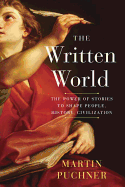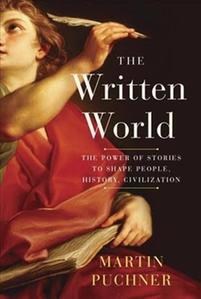
 As the general editor of the Norton Anthology of World Literature, Harvard professor Martin Puchner is superbly qualified to cover the subject of The Written World: The Power of Stories to Shape People, History, Civilization. Circling the globe and spanning human history from the invention of writing to the Internet age, Puchner's book is a lively account of how literature has transformed humanity.
As the general editor of the Norton Anthology of World Literature, Harvard professor Martin Puchner is superbly qualified to cover the subject of The Written World: The Power of Stories to Shape People, History, Civilization. Circling the globe and spanning human history from the invention of writing to the Internet age, Puchner's book is a lively account of how literature has transformed humanity.
The Written World proceeds in roughly chronological fashion, but Puchner structures his narrative around what he identifies as four stages of the story of literature: small groups of scribes responsible for assembling foundational texts like the Hebrew Bible; "teachers' literature" (written accounts of the words of charismatic figures like Jesus and the Buddha recorded by their followers); the emergence of individual authors like Cervantes; and the era of mass production and mass literacy. Whether it's the development of paper or the invention of the printing press, Puchner is also comfortable discussing the decisive impact of technology on the creation and dissemination of literary texts at every stage.
One feature that will appeal to the curious reader is the attention Puchner devotes to literary works that are, at best, only dimly known to Western audiences, something that gives the book a refreshingly global flavor. Discussing The Tale of Genji--which he calls "the first great novel in world literature"--from Japan around the year 1000 C.E., or the 13th-century West African foundational story Epic of Sunjata, not reduced to writing for some 700 years, Puchner demonstrates both a depth of scholarly expertise and the ability to tell an engaging and deeply human story.
Though it would be an overstatement to call The Written World travel literature, it's informed and enlivened by Puchner's descriptions of his journeys to places associated with the works he discusses and their creators. Those trips took him as far away as a 2014 literary festival in Jaipur, India, still abuzz from the appearance of Oprah Winfrey the preceding year, and to the remote mountains of southeastern Mexico in the midst of the Zapatista uprising in 2004. The latter trip was inspired by a Mayan work called the Popol Vuh ("Council Book"), the doomed civilization's desperate attempt to preserve its culture against the onslaught of Spanish conquistadors.
As he brings his account to a close, reflecting on the challenges rapid technological change will pose when it comes to preserving our literature for future generations, Puchner recognizes that we are "still in the middle of this, an ongoing story." Whatever form our literature may take in the coming centuries, this stimulating history leaves little doubt that its influence on every aspect of human life will be profound and enduring. --Harvey Freedenberg, attorney and freelance reviewer
Shelf Talker: Harvard professor Martin Puchner offers an invigorating global survey of literature's deep impact on the course of history.

